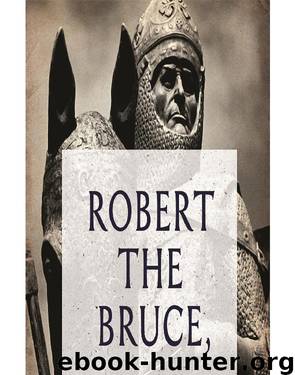Robert the Bruce, King of Scots by Ronald McNair Scott

Author:Ronald McNair Scott [Ronald McNair Scott]
Language: eng
Format: epub
ISBN: 9781847677464
Publisher: Canongate Books
Published: 2014-04-30T16:00:00+00:00
Bruce had used this raid to test the quality of the resistance he might expect, and having found it wanting he resolved to enlarge the scale of his invasion. Taking his army east to link up with James Douglas and his men in Douglasdale and the forest of Selkirk, he first harried the lands of the pro-English Earl of Dunbar, which lay to the west of Berwick and then, on 8 September, crossed the Cheviot Hills into Northumberland as far as Harbottle and Holystone. From there, in a wide sweep over the plains to Redesdale, he burned and looted the crops that were ripening for harvest, drove south as far as Corbridge, which went up in flames, and then fanned out along the valleys of the north and south Tyne on his homeward journey, laying waste those parts which he had overlooked before, and returned to Scotland fifteen days after crossing the border.31
Observing that the wardens of the marches appointed by the English King were impotent in the face of the numbers against them, the Northumbrians took the only course open if they wished to survive. They sent envoys to Bruce to offer money for a temporary truce.
The Scotsmen were in no mood for moderation. For fifteen years their country had been ravaged and impoverished by the English. Their corn crops had been burned, their livestock slaughtered, their farms destroyed, their people killed and throughout their trading ports and burghs the hum of business had been reduced to silence. Slowly the life blood of commerce was beginning to circulate once more through the body politic but the revenue was pitifully small to meet the demands of government and defence.
When Bruce embarked on the raids into northern England which he continued throughout his reign he had two aims in mind: to obtain the money and supplies for the administration of his country and to keep in fighting trim the nucleus of an army.
Now that he had temporarily regained the upper hand his terms were going to be severe. Immunity was granted to the Northumbrians only to February 1312, and for this brief period they were compelled to pay what was for those days the enormous sum of £2000. A similar tax was imposed on the men of Dunbar.32 A formidable protection racket was in the making: but the unwritten rules were observed. The monks in Lanercost Abbey, which was situated only a short distance within the English side of the border, had the best opportunity to know what was happening. They record again and again in their Chronicle that during these raids it was only those who repelled with force the Scottish demands who suffered death.
Nevertheless the inhabitants of northern England must sometimes have felt that an armed knight on a campaign of blackmail was not the highest example of chivalry. The ideals of King Arthur’s knights, to uphold justice and champion the defenceless, were still supposed to be the basic principles of the warrior class. But, even before the War of Scottish Independence, they had seldom been observed in practice.
Download
This site does not store any files on its server. We only index and link to content provided by other sites. Please contact the content providers to delete copyright contents if any and email us, we'll remove relevant links or contents immediately.
| General | Channel Islands |
| England | Northern Ireland |
| Scotland | Wales |
Room 212 by Kate Stewart(5105)
The Crown by Robert Lacey(4806)
Endurance: Shackleton's Incredible Voyage by Alfred Lansing(4769)
The Iron Duke by The Iron Duke(4349)
The Rape of Nanking by Iris Chang(4203)
Joan of Arc by Mary Gordon(4100)
Killing England by Bill O'Reilly(3995)
Say Nothing by Patrick Radden Keefe(3975)
I'll Give You the Sun by Jandy Nelson(3428)
Shadow of Night by Deborah Harkness(3359)
Hitler's Monsters by Eric Kurlander(3328)
Mary, Queen of Scots, and the Murder of Lord Darnley by Alison Weir(3200)
Blood and Sand by Alex Von Tunzelmann(3194)
Eleanor & Park by Rainbow Rowell(3151)
Darkest Hour by Anthony McCarten(3119)
Margaret Thatcher: The Autobiography by Thatcher Margaret(3079)
Book of Life by Deborah Harkness(2931)
Red Famine: Stalin's War on Ukraine by Anne Applebaum(2928)
The One Memory of Flora Banks by Emily Barr(2857)
